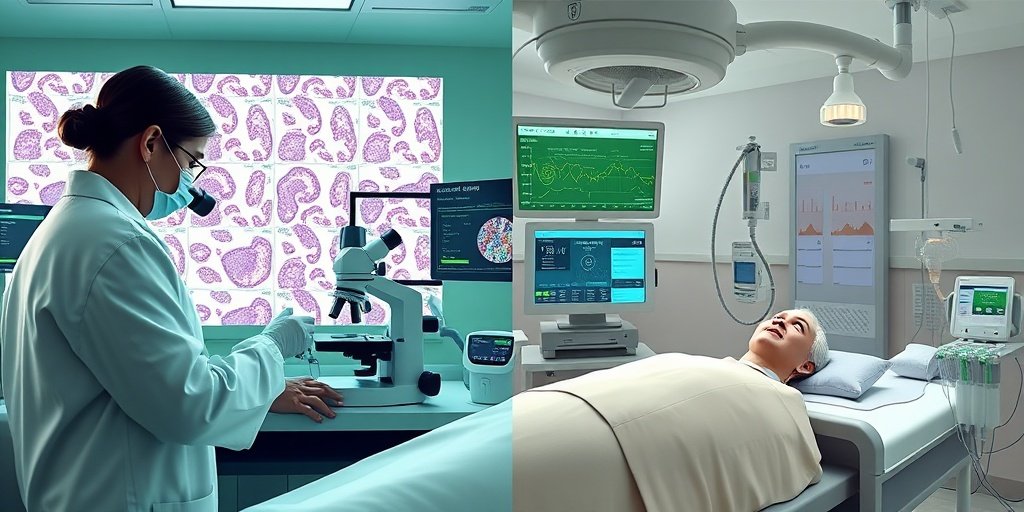⚡ Quick Summary
This study evaluated the efficacy of triplet therapy (HTI) combining hepatic arterial infusion chemotherapy (HAIC) with tyrosine kinase inhibitors (TKIs) and immune checkpoint inhibitors (ICIs) in treating large hepatocellular carcinoma (HCC). The results demonstrated a significant improvement in objective response rate (ORR), progression-free survival (PFS), and overall survival (OS) for patients receiving HTI compared to those receiving HAIC alone.
🔍 Key Details
- 📊 Patient Population: Treatment-naïve patients with large HCCs (> 5 cm)
- 🧩 Study Duration: January 2017 to December 2022
- ⚙️ Comparison Groups: HTI (n=281) vs. HAIC (n=97)
- 🏆 Key Metrics: ORR, PFS, OS
- 🤖 Technology: Deep learning model (HAIM) for predicting HTI response
🔑 Key Takeaways
- 📈 HTI therapy significantly improved ORR (54.45% vs. 21.65%) compared to HAIC.
- ⏳ PFS was notably longer in the HTI group (median 10.9 months vs. 4.9 months).
- 🌟 OS also showed improvement with HTI (median 25.0 months vs. 12.0 months).
- 🧬 HAIM model achieved AUC scores of 0.778, indicating good predictive capability.
- 🔍 No significant differences in ORR were found across different BCLC stages within the HTI group.
- 💡 Personalized management of HCC could be enhanced through the use of HAIM.
- 🌍 Study conducted across two centers, enhancing the reliability of findings.

📚 Background
Hepatocellular carcinoma (HCC) is a leading cause of cancer-related mortality worldwide, particularly in patients with underlying liver disease. Traditional treatment options for large HCCs have been limited, and the integration of triplet therapy (HAIC, TKIs, and ICIs) represents a promising advancement. However, the lack of reliable methods to predict treatment response has hindered personalized approaches to patient management.
🗒️ Study
This study aimed to compare the efficacy of HTI versus HAIC in patients with large HCCs. Researchers collected data from treatment-naïve patients across two medical centers, focusing on key metrics such as ORR, PFS, and OS. Additionally, they developed a deep learning model, the Hepatocellular Carcinoma Artificial Intelligence Prediction Model (HAIM), to predict patient responses to HTI based on pre-treatment biopsy slides.
📈 Results
The findings revealed that patients receiving HTI experienced a significantly higher objective response rate of 54.45% compared to 21.65% in the HAIC group. Furthermore, the median progression-free survival was 10.9 months for HTI versus 4.9 months for HAIC, while the median overall survival was 25.0 months compared to 12.0 months. The HAIM model demonstrated promising predictive capabilities with AUC scores indicating its potential utility in clinical settings.
🌍 Impact and Implications
The integration of TKIs and ICIs with HAIC not only enhances treatment outcomes for patients with large HCCs but also paves the way for more personalized treatment strategies. The development of the HAIM model signifies a breakthrough in utilizing deep learning for predicting treatment responses, which could lead to improved patient management and tailored therapeutic approaches in oncology.
🔮 Conclusion
This study highlights the significant advancements in the treatment of large hepatocellular carcinoma through the use of triplet therapy. The promising results regarding ORR, PFS, and OS underscore the potential of combining HAIC with TKIs and ICIs. Moreover, the HAIM model offers a novel tool for predicting treatment responses, marking a step forward in personalized cancer care. Continued research in this area is essential to further refine these approaches and improve patient outcomes.
💬 Your comments
What are your thoughts on the integration of deep learning in predicting treatment responses for HCC? We would love to hear your insights! 💬 Leave your comments below or connect with us on social media:
Histopathologic deep learning model for predicting tumor response to hepatic arterial infusion chemotherapy plus TKIs and ICIs in large hepatocellular carcinoma.
Abstract
BACKGROUND: While triplet therapy (HTI), which combines hepatic arterial infusion chemotherapy (HAIC) with tyrosine kinase inhibitors and immune checkpoint inhibitors, is widely used in the treatment of large hepatocellular carcinoma (HCC), there are few reports about its efficacy versus HAIC, and no reliable methods are available for promptly predicting HTI response.
METHODS: This study included treatment-naïve patients with large HCCs (> 5 cm in diameter) from two centers between January 2017 and December 2022. Objective response rate (ORR), progression-free survival (PFS), and overall survival (OS) were compared between the HTI and HAIC groups. To efficiently predict HTI response, available pre-treatment H&E-stained biopsy slides of HCC patients were collected to develop deep-learning models.
RESULTS: Compared to group HAIC (n = 97), group HTI (n = 281) showed an ORR (54.45% vs. 21.65%), PFS (median, 10.9 vs. 4.9 months), and OS (median, 25.0 vs. 12.0 months). No significant differences in ORR were observed within the HTI group across different BCLC stages. A deep learning model, termed the Hepatocellular Carcinoma Artificial Intelligence Prediction Model (HAIM), was developed using pathological slides of HTI-treated patients (n = 194). HAIM achieved AUC scores of 0.778 (entire testing set), 0.735 (internal testing set), and 0.853 (external testing set).
CONCLUSIONS: Integrating TKIs and ICIs with HAIC significantly improved ORR, PFS, and OS in all stages of large HCCs. HAIM, derived from histopathological images of the biopsy, showed potential clinical aid for predicting HTI response, providing a novel tool for personalized management of HCC.
Author: [‘Lin C’, ‘Ren Y’, ‘Huang Y’, ‘Li S’, ‘Zhang J’, ‘Kang S’, ‘Li S’, ‘You C’, ‘Cao Q’, ‘Liu F’]
Journal: Cancer Imaging
Citation: Lin C, et al. Histopathologic deep learning model for predicting tumor response to hepatic arterial infusion chemotherapy plus TKIs and ICIs in large hepatocellular carcinoma. Histopathologic deep learning model for predicting tumor response to hepatic arterial infusion chemotherapy plus TKIs and ICIs in large hepatocellular carcinoma. 2025; 25:68. doi: 10.1186/s40644-025-00885-x